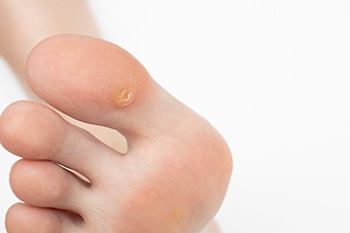6734 Lankershim Blvd
North Hollywood, CA 91606

Plantar warts are growths that appear on the soles of the feet, often causing discomfort when walking or standing. These warts are caused by the human papillomavirus, or HPV, which enters the skin through tiny cuts or abrasions. The virus thrives in warm, moist environments, so places like swimming pools, locker rooms, and public showers are common areas for transmission. Plantar warts can be identified by their rough, calloused appearance, sometimes with black dots in the center, which are tiny blood vessels. While some warts may go away on their own, they can take months or even years to resolve, and in some cases, may worsen or spread. Treatment options include cryotherapy, freezing, laser treatment, or minor surgical removal by a podiatrist. This type of doctor can determine the best course of action, ensuring the wart is treated effectively, and preventing infections or complications. If you have a plantar wart, it is suggested that you schedule an appointment with a podiatrist.
Plantar warts can be very uncomfortable. If you need your feet checked, contact Dr. Jennifer Woo from California. Our doctor will assist you with all of your foot and ankle needs.
About Plantar Warts
Plantar warts are the result of HPV, or human papillomavirus, getting into open wounds on the feet. They are mostly found on the heels or balls of the feet.
While plantar warts are generally harmless, those experiencing excessive pain or those suffering from diabetes or a compromised immune system require immediate medical care. Plantar warts are easily diagnosed, usually through scraping off a bit of rough skin or by getting a biopsy.
Symptoms
Treatment
To help prevent developing plantar warts, avoid walking barefoot over abrasive surfaces that can cause cuts or wounds for HPV to get into. Avoiding direct contact with other warts, as well as not picking or rubbing existing warts, can help prevent the further spread of plantar warts. However, if you think you have developed plantar warts, speak to your podiatrist. He or she can diagnose the warts on your feet and recommend the appropriate treatment options.
If you have any questions please feel free to contact our office located in North Hollywood, CA . We offer the newest diagnostic and treatment technologies for all your foot and ankle needs.